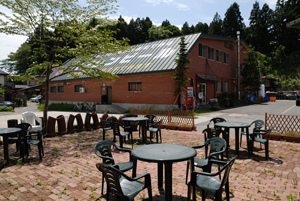
Baeren was having their Spring festival, by fortuitous chance, when we came to Morioka. Hundreds had converged on their brewery by the town’s edge to drink delicious German-style beers under festival tents erected in the parking lot. Children drew colorful pictures with chalk on the pavement. A small contingent from the foreign community came, one of them, a home brewer, full of praise for Baeren. The entire Baeren staff was there too, more than happy to give us a tour of the brewery and talk a little about their history.
The brewery was a little late on the scene, opening in 2003, well after the initial craft-beer brewery boom in the late 90s. When we ask Kimura Takeshi, the president, he gives a simple answer as to why.
“Other breweries at that time had parent companies. It took us longer to obtain the money and equipment.”
In less than ten years, they have mastered their brewing techniques, expanded their business, and obviously created significant community support. People aren’t just thankful to have an excellent local brewery; they are genuinely proud of it. Guests at the festival were quick to say so.
Baeren originally had a German brewer, and together with Kimura and Shimada Yoichi, they started out with basic German styles on German equipment.
Says Shimada Yoichi, the director, “The beers we originally brewed have basically stayed the same, but we’ve created some new ones along the way.”
The team has stayed true to its roots, both technical and geographical. Although Baeren bottles and the occasional keg are available in other parts of Honshu, Baeren remains focused on serving local craft-beer lovers in Iwate prefecture, especially Morioka. After the quake, they questioned whether they should even have the popular festival—the “self-restraint” (jishuku) policies gripping much of Japan caused them to second-guess themselves.
Miyaki Takao, another braumeister, explained, “We thought about what we could do after the quake. Well, we make beer. What’s the point of our beer? To make people happy. We decided to go ahead with it, ready to adjust if we needed.”
We certainly heard no complaints that day.
The Baeren brewery is unusual—you could almost say fascinating. It contains some beautiful, vintage equipment, the oldest of it dating back over 100 years. The newer equipment includes tanks imported by BET. Some are familiar with the accident several years ago in which a tank fell over, taking the life of one of their brewers. That particular equipment is no longer used, the tanks now have additional braces bolting the legs to the ground, and the brewer who came to replace him was Miyaki, a friend.
Miyaki started with no knowledge of brewing, but has bloomed as a brewer, even adding some of his own recipes, like the kölsch, to the Baeren line-up. Miyaki, too, is committed to the brewery’s roots.
“I’ve made a chocolate stout, but I haven’t really thought about making U.S. or English-style beers. We have German equipment and German recipes from a German braumeister, so I’ll probably stick with this.”
Much to our surprise, Miyaki shows us a room with a huge cool ship. We’d never seen one in Japan. Obviously, the risks for contamination—and financial loss—are high. With a cool ship, hot wort is pumped into the open basin after the boil, rather than being cooled in a sterile environment. There, it is allowed to cool naturally. Natural bacteria and wild yeasts settle on the cooled wort. These yeasts, rather than varieties the brewer adds, will ferment the beer, adding unique—often sour—flavors. It takes a long time and a bad batch is undrinkable. Iwate’s cooler air makes this technique possible in theory. We learn that the president actually did boldly brew some years ago. We hope they give it another go.
In town, Baeren operates two beer restaurants, the larger of which, in Nakanohashi, serves the entire Baeren line-up as well as some imports. The other, in Zaimoku-cho, is perched scenically on the huge river that flows through town, its banks abloom with color in the warmer months. Set aside some time to take a stroll. The majestic Iwate Mountain rises in the distance far upstream, its peak capped with snow many months of the year. Take a deep breath of the fresh Iwate air. Take a long sip of the bottle in your hand. Give thanks to Baeren.
This article was published in Japan Beer Times # () and is among the limited content available online. Order your copy through our online shop or download the digital version from the iTunes store to access the full contents of this issue.



